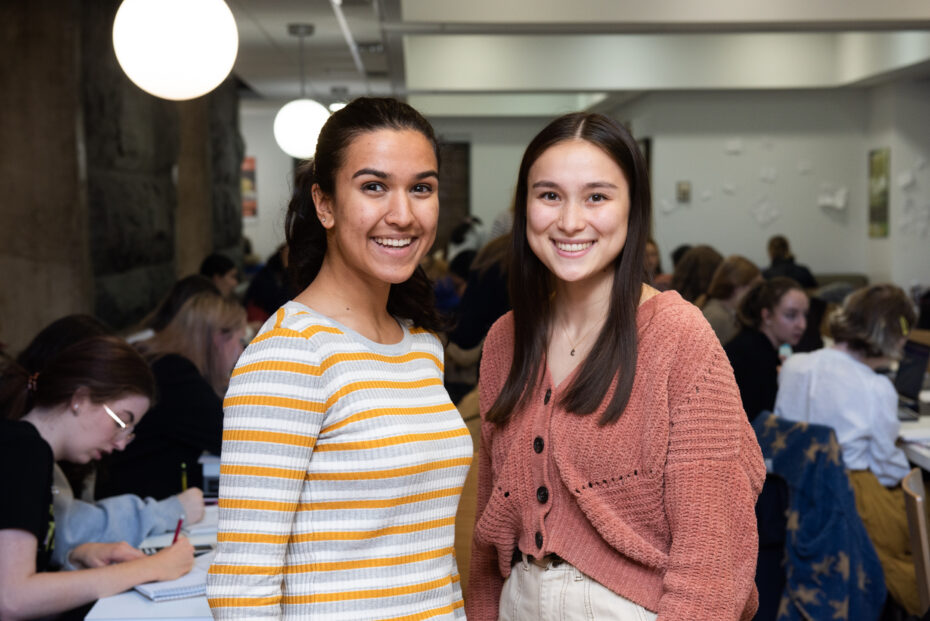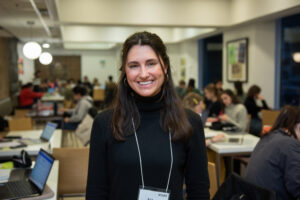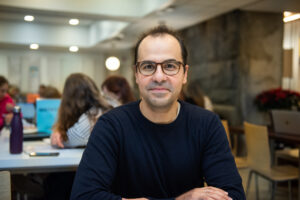
Each year, around 1,000 new students begin an undergraduate science degree at McGill. For many of them, their first year at university represents a dramatic change from the world of high school or CEGEP.
“The workload, the amount of new content you get, and a different style of testing” are three of the challenges Marie Walker recalls from her first semester as a science undergrad.
“At high school, teachers kind of push you to stay on track; at university, you have to do it yourself more. All of a sudden, you have a mid-term and you’re like, ‘Oh my gosh, how do I study for this class?’”
Now in her third year, the physiology major from Calgary says SciLearn, the Faculty of Science’s neuroscience-based learning skills program – which she took in her very first semester at McGill – helped bridge the gap, both academically and socially.
“SciLearn is a great way to meet people,” Marie says. “But also, it helps you zero in on learning strategies. Sometimes you don’t realize how you learn best, but when it’s laid out for you, you realize, ‘I could use this strategy for this class or this strategy for a different class.’”
Evidence-based strategies to help students learn
First-year science students get their first taste of what SciLearn has to offer with orientation sessions run in August and January each year. Since its inception in fall 2020, the program has been grounded in a scientific approach to learning, using insights from neuroscience to shed light on techniques and lifestyle habits that have been proven to enhance cognitive function.
Third-year pharmacology major Alia Devasahayam, who was also part of the first group of students to participate in SciLearn, says that while she had an intuitive sense of the value of many of the ideas presented in the program, seeing the scientific data to back up all the good advice left a lasting impression.
“Knowing why made all the difference,” she says, recalling a string of topics covered by SciLearn. “They showed us, here’s why studying in groups is effective, this is the data from students who did – and didn’t – exercise, here’s how it affects your mental health, your academic success, that kind of stuff.
“Of course, I knew sleep is good, exercise is good, human interaction is good. But seeing why made a big difference.”
Back-to-campus opens new avenues for SciLearn
So much did Alia and Marie enjoy SciLearn that they both went on to join the Office of Science Education (OSE) team as SciLearn mentors to other students. OSE Student Engagement Officer Kira Smith, who co-leads SciLearn, says involving former participants in this way has been invaluable in ensuring the program continues to be attuned to students’ needs.

“We’re really fortunate to work with students who have taken SciLearn,” Smith says. “They’ve really informed how our program operates.”
With McGill’s return to full in-person teaching in fall 2022, SciLearn has expanded to include in-person peer collaboration sessions, which run throughout the semester. Building on the legacy of the successful FRezCa program, these drop-in study sessions at the Royal Victoria College cafeteria – a space graciously made available by Student Housing and Hospitality Services – give students a place where they can work together with help from teaching assistants and instructors.
“We decided to launch SciLearn peer collaboration fully in-person this September because we heard that students were really missing that – they felt isolated, disconnected,” Smith says. “As much as the strategies [from the orientation session] were useful, that relationship over the term was missing as they haven’t had a forum to connect.”
On the ground at the peer collaboration sessions, SciLearn mentor Devasahayam says it’s rewarding to see students having “eureka moments” when working on problems with their classmates.
“It opens up the opportunity for you to talk to somebody else. People’s brains work differently, and that can trigger different things, so I think it’s very valuable, the group perspective.”
Making SciLearn even better
Dedicated to continual improvement, the SciLearn team are tireless in their efforts to ensure not only that the program serves its purpose of helping students learn better but also that it is as accessible as possible for new students juggling multiple demands on their time.

“A general principle for us is really trying to meet students where they’re at,” says Smith, pointing to the integration of SciLearn workshops into two undergraduate science courses taken by a large percentage of first-year students, Introduction to Psychology and Introductory Organic Chemistry. Students in either course can receive a bonus towards their final grade by taking an optional SciLearn workshop. Initiatives like this have seen participation in SciLearn grow from around 100 students in fall 2020 to over 500 this semester. Since its inception, the program’s growth has also been aided by generous and ongoing funding support from the DGDM Family Foundation.
True to their scientific pedigree, the SciLearn team take a rigorous approach to research and evaluation when it comes to improving the program, employing machine learning methods to analyze participant feedback on the learning strategies that work best for them.
“We perform data analytics and modeling which helps us understand how students navigate challenging first-year science courses and which study techniques prove to be effective,” explains SciLearn co-lead Armin Yazdani, who holds a Ph.D. in neuroscience and plays a key role in developing the program’s content.
“The combination of neuroscience and data science will not only help us understand how our students learn, but also different paths towards success.”

Thank you for this posting.
Thank you for this Posting, I am wondering do you have a guideline for someone whom was away from studying and started after almost 30 years, to improve learning?
I am looking forward to hear about that.
Keep up the good work